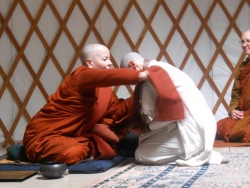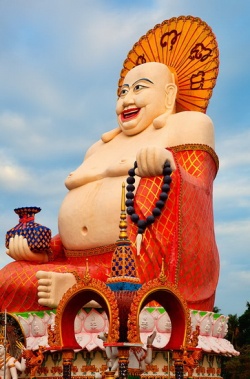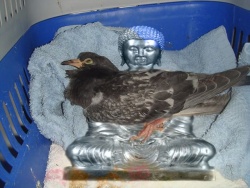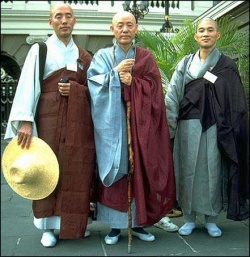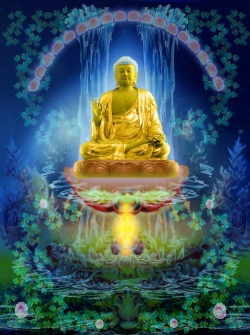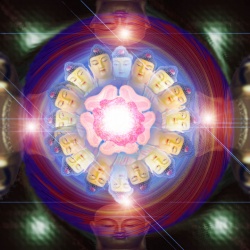People
Other People
People are sometimes attracted to Buddhism via the glamour of spiritual heroes and heroines. In a world where there are few truly solitary individuals, the hermit is one of the most admired role models: "We may revere a Gampopa but we'd like to hang out with Milarepa."
However, it is a requirement for achieving enlightenment, or ultimate liberation and happiness, to devote her or himself to the sangha.
Sangha, as one of the Three Refuges, can refer to:
1. The historical Buddha's group of disciples who are also the "progenitors" of Buddhism
2. The community of Bodhisattvas (stream-enterers) who have the capacity to help us out of the vicious cycle that is Samsara.
3. But sangha is also the community of Buddhist practitioners with whom a person shares the way; the Buddhist group to which we may belong.
4. In its broadest sense sangha could mean "all well-intentioned beings" but usually in that instance the preferred phrase is 'the community.'
In any case, the objectives of Buddhism are difficult to attain in a solitary context.
We tend to admire Gampopa or other lineage founders for having created the "structures for transmission of the Dharma in an organized fashion," but we may consider Milarepa (or Bodhidharma, or Han Shan) to be superior in some ways because they spent time as hermits.
None of those people "were truly solitary and certainly not isolated although they obviously had significant periods of closed practice. Didn't Milarepa have thousands of students? And even Bodhidharma was an abbot (for awhile)."
Without the support of other people, those men could not have been hermits. The previous Dolpo Rinpoche (a.k.a. Shiri Lama) was enclosed for most of the years of his life, high in his Himalayan cave in meditation for the benefit of all beings. But he could not have done so without the support of sangha and community that cared for his physical well-being, bringing him food and caring for his health.
Interaction with other people also provide opportunities for the practice of the Perfections of patience, generosity and so on.
"In one of his short teachings, Tsongkhapa talks about rishis who practiced solitarily. As long as they kept to their meditative state, everything was fine. One of them came out of meditation and discovered that rats had eaten his long hair. He flew into a rage. Later, because of this anger, he was reborn in hell.
Meditation is an essential aspect of Buddhism and it is easier for most people to do that away from the distracting input of the world and of other people. "But the world manifests itself to us due to our karma. While purifying our mindstream, it seems we also at least purify our perceptions. This can only be done in concert with others."
Milarepa's story provides many examples of that. It was the actions of others that provided him the opportunity to attain his great level of realization. If his aunt had not abused him, he could not have practiced patience. The cruelty of others and the tragedy of finding his mother's bones abandoned in their former home contributed to his achieving a compassion that was all-inclusive.
Had the sorcerer who was Milarepa's first teacher not been so afraid of damnation, he would not have needed any help; it was his request for salvation that led Milarepa to try to attain enlightenment.
Many teachers make the point of saying that it is essential to interact with people and that we should especially cherish people who seem to view us negatively. Shri Atisha Dipankara's tradition of the sage of Suvarnadvipa and the system of Mind Training or lojong shows the benefits of working with what is. [Above link is to Ani Pema Chodron's summary at Shambhala.org]
Lama Kathy Wesley (KTC) reminds us that our karma determines the people -- or at least, the kind of people -- that come into contact with us, and theirs does the same. In her experience, there is just no use trying to get away from certain kinds of individuals we find difficult; they will certainly follow you -- even into retreat!
KU, whose reply to a question at the kagyu email group includes the quoted material here, concluded:
I certainly understand the impulse toward hermit life. But opting out of interaction with people for self-protective reasons seems to be a dead end. How can we really develop as Bodhisattvas? Even deluded, we are the 1000 arms of Chenrezig.
Being deluded, don't we need the blessings of the Buddhas and our lamas, and the interaction with our Vajra bothers and sisters to anchor us?
Well, sometimes the interaction side of that anchor is too heavy -- it can tip us over and drag us down, it is true.
One remedy is to arrange a balance. It is good to set aside some time each day for solitary meditation and reflection during which we can fortify our refuge. We can practice our equanimity. We can also contemplate and examine our knee-jerk reactions to unpleasantness, and being more aware, we resolve to carry this consciousness with us through the day.
Ayya Khema (1923-1997) on using love to make others loveable to us (Shambhala Sun)
Consider This
It is frequently taught that:
If someone says something false about you, but you chew on it and mull it over and get angry about it, it is like someone shot an arrow at you but it missed. So you run over, pick it up and stab yourself with it.!
Also, if your feet hurt from walking on rocky ground, you do not need to spend energy trying to pave the road. It is better to get yourself shoes with thicker soles. In other words, we can work on how we handle difficult situations, for we cannot always change the circumstances. Anger
Ngulchu Thogmed Zangpo (1245 - 1369) in 37 Practices of a Bodhisattva said:
Unless our inner enemy -- our own anger -- has been subdued,
Trying to subdue outer enemies only makes more of them.
Therefore, to swiftly raise an army of loving-kindness and compassion,
So as to conquer our own mind-stream, is a practice of the bodhisattvas.
Anger is the most detrimental of emotions, since in its extreme form it can lead us to break the one fundamental precept which is not to take a life.
HANDLING ANGER -- 10 ANTIDOTES
ANTIDOTE 1 - Patience.
Patience is the main antidote to anger. As common wisdom says: just count to 100 ... . During this time, any of the following methods can be effective. The most effective one depends on the actual situation. Especially in our age of rush and intense change, patience may not be seen as a positive quality, but take a minute to think -- impatience can easily give rise to a general feeling of anger.
ANTIDOTE 2 - Realization of Suffering.
Once we understand that problems and frustration are basic facts of life, it can reduce our impatience with our own unrealistic expectations. In other words: nothing is perfect, so don't expect it. Because of the belief that things are or can be perfect, it is easy to feel hurt.
ANTIDOTE 3 - Understanding Cause and Effect
The real reasons for our problems are our own actions, which are in turn caused by our own negative states of mind. If someone makes us angry, it has a sobering effect if we dare to think that the real reasons for this situation are our own past actions, and the person is just a circumstance for our own mind to ripen.
ANTIDOTE 4 - Changing or Accepting.
Basically, we can find ourselves in two types of unpleasant situations: ones we can change and ones we cannot change. If I can change the situation, I should do something about it instead of getting all worked-up and angry. Not acting in such a situation will cause frustration in the end. If I cannot change the situation, I will have to accept it. If I don't, it will only lead to frustration and a negative and unpleasant state of mind, which will make the situation only worse.
For some reasons unclear to me, Westerners (including myself) appear to have big problems with accepting unpleasant situations which we cannot change. Could this be a result of impatience (a form of anger) with imperfection (an unrealistic expectation)?
ANTIDOTE 5 - Realistic Analysis.
For example, someone accuses me of something. If it is true, I apparently made a mistake, so I should listen and learn. If it is untrue, the other person has made a mistake. So what? Nobody is perfect. I also make mistakes, and it is all too easy to label the other as "enemy," in which case a helpful discussion or forgiving becomes difficult. It may also be worthwhile searching for the real underlying reason of the problem. Of special importance is to evaluate one's own role in the situation: my own fears, insecurity, being very unfriendly, or not being blameless (like leaving home much too late for an appointment and blaming the 5-minute delay of the train).
ANTIDOTE 6 - Equanimity.
Equanimity means that one realizes the basic equality of all people; others want happiness, just like I do. Others make mistakes just like I do. Others are confused, angry, attached just like I often am. Is the other person happy in this situation, or just struggling like I am?
ANTIDOTE 7 - Openness
Be prepared to be open for the motivation of others to do what causes you problems. Talking it over and being prepared to listen can suddenly make a problem acceptable. Did you ever notice the difference when a plane or train has much delay and nobody gives any reasons for it? People very quickly become irritated and hostile. Then when the driver or pilot explains there is a technical defect or an accident, suddenly waiting becomes easier.
ANTIDOTE 8 - Relativity.
Ask yourself if this situation is actually important enough to spoil your own and other people's mood. Is this problem worth getting upset in a life where death can hit me at any moment?
ANTIDOTE 9 - Change Your Motivation.
In case a situation is really unacceptable, and another person needs to be convinced that something is to be done or changed, there is no need to become upset and angry. It is likely much more efficient if you show of understanding and try to make the other understand the need for change. If one needs to appear angry for some reason to convince the other person of the seriousness of the situation, one can think like a parent acting wrathful to prevent the child from harming itself.
ANTIDOTE 10 - Renew Your Acquaintance with Emptiness.
reminder courtesy Lobster at The Kagyu Mailing List
HH Dalai Lama in Ethics for the New Millenium explains the Tibetan word for compassion:
"As such, our innate capacity for empathy is the source of that most precious
of all human qualities, which in Tibetan we call nying je. Now while generally
translated simply as "compassion," the term nying je has a wealth of meaning
that is difficult to convey succinctly, though the ideas it contains are
universally understood. It connotes love, affection, kindness, gentleness,
generosity of spirit, and warm-heartedness. It is also used as term of both
sympathy and of endearment. On the other hand, it does not imply "pity" as the
word compassion may. There is no sense of condescension. On the contrary,
nying je denotes a feeling of connection with others, reflecting its origins
in empathy."
Living in Compassion (Rinchen, Inc., May 2001) by Ven. Bardor Tulku-Rinpoche of Karma Triyana Dharmachakra, His Holiness Karmapa's seat in North America, includes a discussion of marriage and relationships; a commentary on The 37 Practices of a Bodhisattva; the Six Perfections, and more. The book is US$16.95 and is available from Namse Bangdzo.
Rinpoche, who is married and has three daughters, is well qualified to write about such things:
Question: One important quality you have talked about is limitless
compassion. Sometimes there are situations, however, where that
particular attitude might not be understood. Perhaps someone like a drug addict or an alcoholic may see your compassion and decide to take advantage of you. Do you have any suggestions on how to practice compassion in that situation?
Rinpoche: In walking the bodhisattva path, we need to avoid what has been called "idiot compassion." That refers to compassion that tries to be "nice" and make people happy. It involves doing what they want rather than what is needed. It is really about making ourselves feel good, rather than actually practicing compassion. What is missing in this is wisdom. Bodhisattvas cultivate and practice limitless compassion which is endowed with the quality of wisdom. When you have that, no one can take advantage of you because of the sharpness and clarity of that wisdom. It cuts through any faults or mistakes that might come about, including being taken advantage of. In a situation where someone is trying to take advantage of you, you will actually know what will benefit them and what will not. With that awareness, you can apply your compassion and do your best for that person, even if it means not doing what they want. When the compassion is joined with authentic wisdom in this way, the outcome will always be beneficial.
Venerable Bardor Tulku-Rinpoche, 45-46.
AND
one of the negative actions connected with speech is known as "hurtful speech." This could mean any kind of aggressive verbal abuse, and it could mean creating disharmony between friends, relatives, husbands and wives, or in a community, all by engaging in negative talk. The opposite, positive action would be to engage in gentle, conciliatory, and helpful speech. ( 29)
As we close this section, there are a few things I would like you to remember. First, there are a few more thoughts from Padampa Sangye, who was one of the great teachers of Buddhism in Tibet.
He said that much of the time our communications with each other are like the way people talk in a crowded marketplace. People are chattering at the same time but not listening to each other. He was saying that we need to learn to listen to each other, appreciate our relationships, and learn to work with difficulties of the situation rather than alienating ourselves from each other. He also said that it is the responsibility of men and women to love each other and work out their relationships." (41)
The second of the four things taught in the sutras is abandoning criticism of other bodhisattvas, which means other mahayana practitioners in general, and especially realized bodhisattvas. It says, in stanza thirty-two, "If, under the power of mental afflictions, a mahayana practitioner proclaims the defects of another bodhisattva or mahayana practitioner, the the proclaimer becomes impaired (the proclaimer's virtue degenerates). It is therefore the practice of bodhisattvas not to proclaim the defects of those who have entered the mahayana."
This refers to situations where through the power of mental afflictions, especially jealousy, a mahayana practitioner bad-mouths another mahayana practitioner -- proclaims their downfalls, the defects in their conduct, their general failings, and so on. And this only hurts the one who is broadcasting the faults, because they are acting out jealousy.
It is therefore the practice of bodhisattvas not to criticize other beings in general, and especially those who have entered any vehicle of Dharma, and most particularly the mahayana. In short it means to be careful with your speech -- to control your speech. Essentially the point of this, which goes along with the previous stanza, is to be more concerned with your own defects than the defects of others (94-95.)
Finally, the fourth thing taught in the sutras is to abandon harsh speech. In stanza thirty-four it says, "Since harsh words agitate the minds of others, and therefore cause one's bodhisattva conduct to degenerate, it is the practice of bodhisattvas to abandon harsh words that are unpleasant for others."
When we do not pay attention to our own defects through carelessness, for example, we may become angry and carelessly speak harshly to others and agitate them. This can hurt their feelings and make them angry. Therefore bodhisattvas and those practicing the mahayana should speak gently when they speak. They should speak appropriately, and in a manner that is easy on the ears and that sounds right to those who are hearing it.
When you speak carelessly and hurt someone's feelings, this is obviously going directly against the whole purpose of the bodhisattva path -- which is not to cause suffering, but to bring beings happiness. It is therefore a great downfall for a bodhisattva to do so. Therefore bodhisattvas abandon harsh words, which means that they think carefully about what sort of language and what sort of things to say that will actually be pleasant and appropriate for that person. Watching one's speech is very important. In general it is said, "When alone, look at your mind; when in company, look at what you are saying." (95-96.)
Question: I wanted to ask about verse thirty-two, which is connected with abandoning criticism of other bodhisattvas. Is it ever appropriate, under special circumstances, if you feel that there are individuals who could be harming others, and you feel that to benefit someone else, you should let them know about this person's activity?
Rinpoche: The text is not saying that you should never criticize other practitioners. If appropriate, you can and should do so when it is necessary in order to prevent a situation of harm or abuse, as you said. However, you should not do so out of dislike or jealousy. ~ (Bardor Tulku-Rinpoche 103) Namo Guruye
see also:Humans
